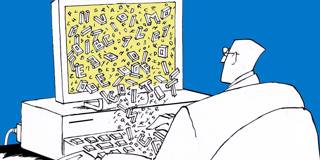Since the invention of writing, human innovation has transformed how we formulate new ideas, organize our societies, and communicate with one another. But in an age of rapid-fire social media and nonstop algorithm-generated outrage, technology is no longer helping to expand or enrich the public sphere.
BERKELEY – Since 1900, human technology and organization have been evolving at a blistering pace. The degree of change that occurs in just one year would have taken 50 years or more before 1500. War and politics used to be the meat of human history, with advances in technology and organization unfolding very slowly – if at all – in the background. Now, the inverse is true.
The impact of technological innovation on the marketplace of ideas has brought about some of the most consequential changes. The shift from the age of handwritten and hand-copied manuscripts to that of the Gutenberg press ushered in the Copernican Revolution (along with almost two centuries of genocidal religious war). Pamphlets and coffee houses broadened the public sphere and positioned public opinion as a powerful constraint on political rulers’ behavior.
As John Adams, the second president of the United States, later pointed out, the “[American] Revolution was effected before the war commenced … in the minds and hearts of the people.” The decisive intellectual battle, we now know, was won by the English-born printer Thomas Paine’s pamphlet Common Sense. Still, even during the revolutionary period, the pace of change was far slower than it is today. In the space of just two human lifetimes, we have gone from mass-market newspapers and press lords to radio and network television, and then on to the Internet and today’s social media-driven public sphere. And most of us will live long enough to witness whatever comes next.

BERKELEY – Since 1900, human technology and organization have been evolving at a blistering pace. The degree of change that occurs in just one year would have taken 50 years or more before 1500. War and politics used to be the meat of human history, with advances in technology and organization unfolding very slowly – if at all – in the background. Now, the inverse is true.
The impact of technological innovation on the marketplace of ideas has brought about some of the most consequential changes. The shift from the age of handwritten and hand-copied manuscripts to that of the Gutenberg press ushered in the Copernican Revolution (along with almost two centuries of genocidal religious war). Pamphlets and coffee houses broadened the public sphere and positioned public opinion as a powerful constraint on political rulers’ behavior.
As John Adams, the second president of the United States, later pointed out, the “[American] Revolution was effected before the war commenced … in the minds and hearts of the people.” The decisive intellectual battle, we now know, was won by the English-born printer Thomas Paine’s pamphlet Common Sense. Still, even during the revolutionary period, the pace of change was far slower than it is today. In the space of just two human lifetimes, we have gone from mass-market newspapers and press lords to radio and network television, and then on to the Internet and today’s social media-driven public sphere. And most of us will live long enough to witness whatever comes next.